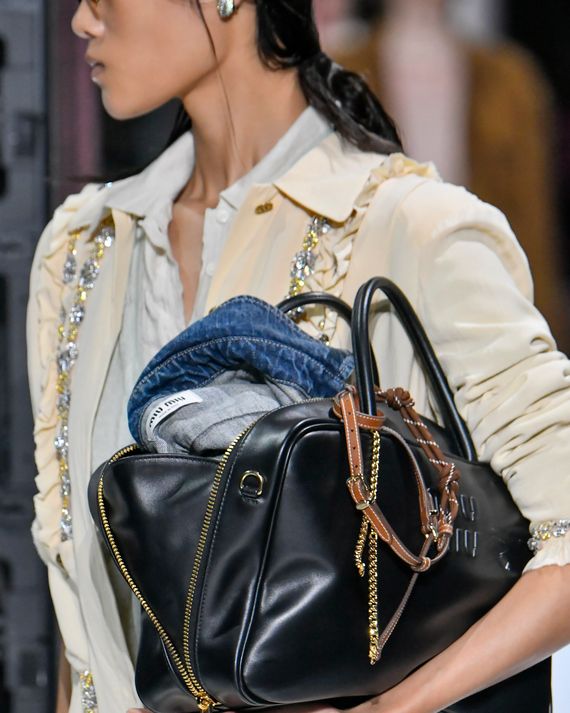
There’s been a subtle but noticeable shift within the fashion industry, in which the dopamine dressing we saw in the early years of the pandemic has been replaced with something much more pragmatic. Let’s call it commuter-core. In recent months, I’ve noticed that fashion folks have swapped out platforms for Salomon Sportstyle and ballet flats; brands like Bottega Veneta and Norma Kamali used denim (or something akin) in their collections; and wildly impractical micro-bags are being replaced with roomy alternatives à la Maximilan Davis’s expanded tote for Ferragamo. This year proves that aesthetics are no longer the priority — our clothing must also work hard in our wardrobes.
During Shanghai Fashion Week, Markgong showed a collection of sharp tailoring in an office building, with models scanning their work badges through the speed gate, coffee in hand. New York designer Jane Wade aptly named her spring/summer 2024 collection “The Commute” and was inspired by what people are wearing to work and how it serves them both inside and outside of the cubicle. “Like a girl wearing her heels but carrying her Salomons because she was too busy to go home and change,” she says. “The next young generation of industry leaders emerging are individuals who have more than just a job behind a desk.”
We also saw looks focused on function, like Carhartt WIPs with Sacai; Miu Miu’s cargo bag; and Attico’s signature pants with oversize pockets, which have become so popular the brand keeps bringing them back season after season in new materials and colors.


And then there is all the actual commuting we are now doing. To meet the moment, Cherry Los Angeles dedicated its recent lookbook to travel, and it shows models leaving the airport in clothing like camo cargo pants and white tank tops under Vanson leather moto jackets. And how could we forget (we tried) Gucci’s recent campaign featuring Kendall Jenner and Bad Bunny making their way through an airport, toting pieces from the house’s logo-clad luggage collection in matching outerwear and sneakers.


Shakaila Forbes Bell, fashion psychologist and author of Big Dress Energy, attributes this change to people placing their well-being and comfort at the top of their priorities. “Studies have shown that cognitive processing is negatively impacted by uncomfortable attire,” she tells the Cut. “As our lives become increasingly hectic, we can’t afford to waste brain power focusing on how painful our attire is, so it makes sense why functional fashion, which often focuses on comfort, will remain top of mind for modern consumers.” In other words: Bring on the cargo pants.





